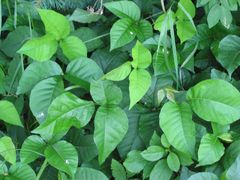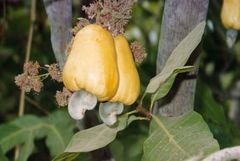 Poison ivy allergy is the cause of the rash you get when exposed to this plant.
Poison ivy allergy is the cause of the rash you get when exposed to this plant.
Mangoes allergies are closely related: read on.
Poison ivy protects itself in a very sneaky way. It produces urushiol, which irritates the skin, causing an allergic reaction. This is another example of a contact allergy.
The symptoms are typically blistering, unbearably itchy skin.
About 15% to 30% of the population (according to a Wikipedia article) are not allergic to Urushiol, sparing them the effects of poison ivy. It is possible for these people to develop an allergy after repeated exposure, so if you are immune to poison ivy, don’t take it for granted!
Urushiol does not need the plant to have an effect. The chemical can remain active for up to five years, and can transfer from other objects, such as boots or pant-legs.
Eating mangos can make the reaction worse, so avoid mangos if you are experiencing a poison ivy rash.
Poison ivy should never be burned as the allergen spreads in the smoke, could be inhaled, and cause serious lung problems.
Other Plants that Produce Urushiol
Poison ivy is not the only plant to produce Urushiol. We even eat some of the plants:

- Poison oak
- Poison ivy
- Poison sumac
- Cashew fruit (the cashew nut grows below the fruit)
- Mango sap (and peel in very small amounts)
Mango Allergy
Mango allergy reactions are caused by Urushiol in the sap. Most people do not seem to be bothered by the about of Urushiol in mango skin, but some people become sensitized and develop allergic reactions to mango.
If you suspect that you may be sensitive to Urushiol (for example, if you have had a bad reaction to poison ivy), I suggest you wash your mangos with soap and water before handling them, to reduce your chances of contacting Urushiol.
If you have a strong reaction to Urushiol, you are best to completely avoid mangos.
{ 31 comments… read them below or add one }
← Previous Comments